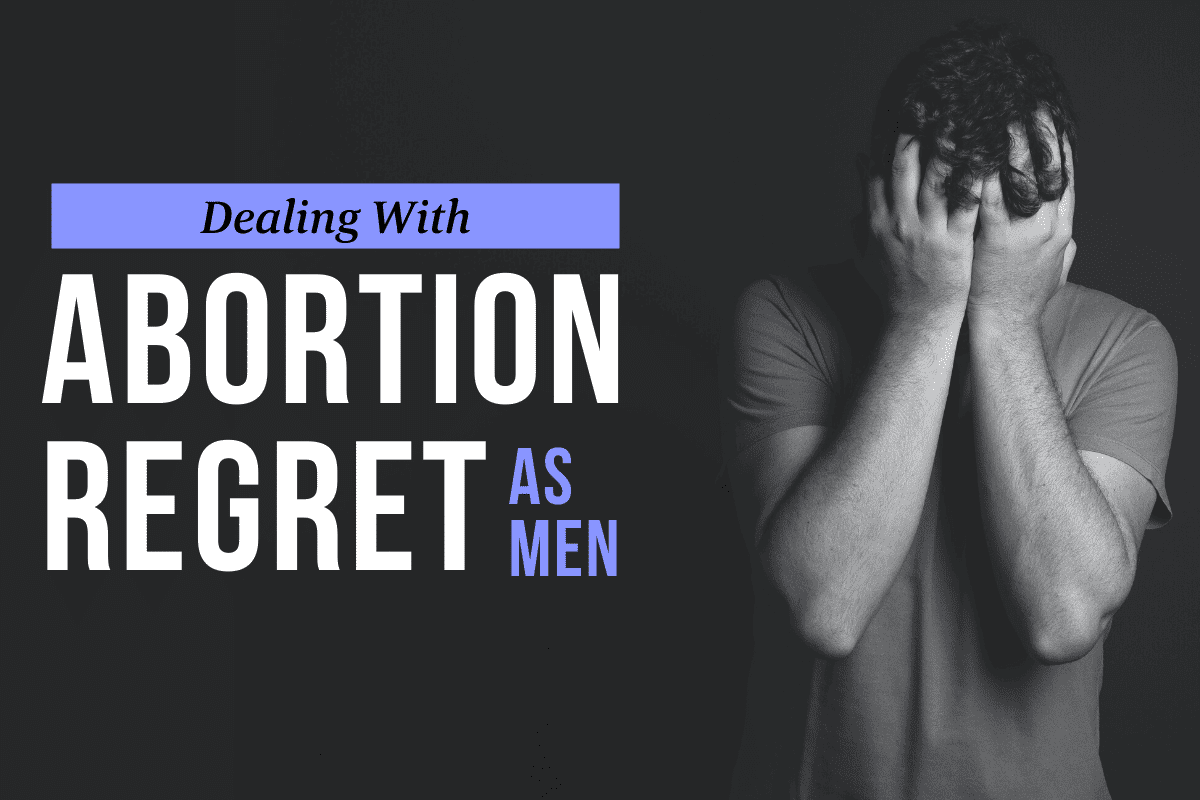It’s been twenty years, but Joseph’s brothers haven’t forgotten. They’ve moved on with their lives and haven’t mentioned Joseph for a long time. There’s no way this Egyptian ruler knows their secret, but why does it feel like this is finally their reckoning for that mistake of long ago? "It wasn’t even my idea," thinks one. "I told you we shouldn’t," says another. But deep down each knows he was a part of it. And deep down, they know that God saw it.
(Genesis 42:21-22)
Sermons and Sunday school lessons about Joseph and his brothers tend to only focus on Joseph: him fleeing temptation, serving in a season of waiting, overcoming hardships and forgiving others. But, most of us have more in common with Joseph’s brothers: bearing burdens from regretful choices and fearing God or others may find us out. And, for some, this burden is abortion regret.
Things We Carry
In a Care Net study, it showed that abortion is a common reality among men in the church, yet one that is rarely addressed. In fact, among 1,000 men whose partners had an abortion:
- 5 in 10 men were attending a Christian church at least once a month at the time of their partner’s abortion.
- Only 5% spoke with anyone in the church about their decision at the time.
- Among those who continued to attend church, only 45% say that anyone at their church knows.
We’ve all heard sermons that tell us we can be forgiven, no matter what the circumstances may be. Perhaps we’ve even held our breath as the pastor offers examples of what Christ can reach, wondering if our deepest struggle will make the list. If it does, we may insist that we don’t need help or deserve it. If it doesn’t, we’re left feeling it’s then too bad to even mention in church.
When it comes to the private and seldom‐mentioned topic of abortion, many men are not likely to hear, let alone embrace, an extension of grace. In the same study, 54% of men said they believe that pastors’ teachings on forgiveness don’t seem to apply to abortion (27% said they believe they could, and 19% said they don’t know). But, it’s important to note that that grace doesn’t simply disappear when it’s hard to accept, and nothing is ever too big for God.
Gray Areas
Over the decades since they threw their brother into a pit and sold him into slavery, Joseph’s brothers found it difficult to gain closure. For one thing, this wasn’t an easy sin to categorize. They were doubtless familiar with the old story of Cain killing Abel in cold blood, but they hadn’t quite done that. Perhaps this was in more of a gray area.
It had been a collective endeavor. Some literally threw Joseph into the pit, others pulled him back out. At least one brother spoke to the slave traders, perhaps another took the money. Some cheered. Others stayed silent. Each might feel guilty for what they did or didn’t do. Each could just as easily blame the other brothers as let the blame rest on their own shoulders. What they had done had been immediately covered up with a lie they told their father: Joseph was torn by a wild beast. It takes a lot of energy to maintain a fake narrative in a family, but even if their consciences suffered, what could justify restarting Jacob’s grieving process with a truth even uglier than their lie?
(Genesis 37:18-36)
American laws and culture depict life in the womb as a “gray area.” It can be difficult for men to sort through their level of involvement in the abortion space when they are told that they don’t have a voice. In Care Net’s study, men whose partners had an abortion consistently fell into three categories:
- 42% either suggested or strongly urged their partner to have an abortion.
- 31% did not give her any advice.
- 27% either suggested or strongly urged her to not have an abortion.
Secrecy Doesn't Help
I’ve spoken personally with men in all three groups, and have observed deep wrestling and confusion within them. Some say, “I feel bad because it was really hard on her, and it was my idea,” “I drove her there and paid for it,” “I told her I wanted her to keep it,” or even, “She should’ve known I wouldn’t want her to have an abortion.” Many say, “I really wanted to leave it up to her,” and some admit, “I should’ve said something.”
With such wrestling, secrecy is often synonymous with abortion, especially within the church. The study also concluded that:
- Christian men that consider themselves evangelical or born again were more likely to select, “I strongly urged her to have an abortion,” than “Other” Americans. (21% vs 9%).
- Those who attended religious services at a Christian church once a month or more at the time of the abortion (21%) were more likely to select, “I didn’t want others to know she was pregnant,” than those who just attended on holidays/rarely attended (10%).
I’ve spoken with men who were seeking abortion specifically because they didn’t want their parents to find out they had gotten someone pregnant. The fear of parental opinion deeply impacted men, where only:
- 27% of men discussed the decision with their mother.
- 17% of men discussed it with their father.
Gray areas, varying levels of involvement and secrecy didn’t give rest to the souls of Joseph’s brothers, and they don’t help men cope with abortion regret either. They only obscure and confuse the repentance and healing that needs to take place. I’ve spoken with men who admit to using drugs, alcohol and sex to cover their abortion regret. Many also share stories of having messy and broken relationships ever since, much like Joseph’s brother Judah in Genesis 38.
Watch: Should Men Have a Say in Abortion?
Related Resources:
Reconciliation
Perhaps the most difficult thing keeping Joseph’s brothers from finding peace was that there was little hope of ever making amends. Joseph was probably long since dead, and they couldn’t go back and change the past. But now they are being called spies and are thrown in jail by a strange Egyptian ruler. Their families need food, and their only escape is a deal that will bring more sorrow to their old father. The brothers start to expect that while they can’t fix the past, they can still be punished for it.
"In truth we are guilty concerning our brother," they say to each other. "That is why this distress has come upon us." The brothers don’t realize that the one getting through to their consciences is the one with the power to forgive and set them free! After testing them, the Egyptian ruler reveals that he is Joseph, their long‐lost brother. He weeps with them, comforts them and speaks kindly to them. He calms their fears of punishment, and declares the good plan of God, despite the ultimately evil intent of their confused and jealous hearts. It’s a beautiful end to a messy story.
(Genesis 45:1-15)
Who will comfort and calm a regretful conscience when the one wronged, as Joseph was, is no longer here? Similarly, how does one experience forgiveness after an abortion? While there is hope of reunion in the next life (see King David’s own story of infant loss in 2 Samuel 12) the story of Joseph points to something far greater.
A Savior
Jacob blesses his reunited sons and offers this special word to Judah, “The scepter will not depart from Judah nor the ruler's staff from between his feet, until tribute comes to him, and to him shall be the obedience of the peoples.”
(Genesis 49:10)
This verse directs us ahead to the coming Messiah. Jesus Christ, the fulfillment of this promise, begins His ministry by gathering twelve men to follow Him, the same number of brothers in our story from Genesis. For three years they learn, eat and serve alongside Him. They even promise to die for Him if necessary. But when His hour of greatest need arrives, those same disciples fall asleep. One betrays Him and sells Him for silver.
Another, His most loyal, denies Him three times. After being betrayed and abandoned by his dearest friends, Jesus is crucified.
The Best Way to Deal with Abortion Regret
But Christ’s death accomplishes something only foreshadowed in the story of Genesis; something powerful enough to stretch millenniums backward and forward. His death is not only because of a few who failed Him, but also on behalf of all of us who have failed Him and each other. He takes our sins on the cross and pays for them once and for all. He returns from the grave and ascends to heaven to live and intercede for us. This atonement reaches deep into our brokenness and is sufficient for every sin, including abortion.
Joseph’s brothers should have been willing to stand by their own flesh and blood, even if they were jealous by his dreams. Jesus’ disciples should have watched and prayed with their Lord, despite temptation and tiredness. Fathers of preborn children ought to be found caring for their partner and speaking for the life of their child, whatever the scenario. But, one thing will remain the same, no matter what: forgiveness and reconciliation are promised and waiting at the cross.
No matter how hard it may be to imagine a path out of years of guilt, secrecy and confusion from past mistakes, Jesus will make a way. The best way to deal with abortion regret as men starts here: repenting and receiving Christ’s forgiveness.

















